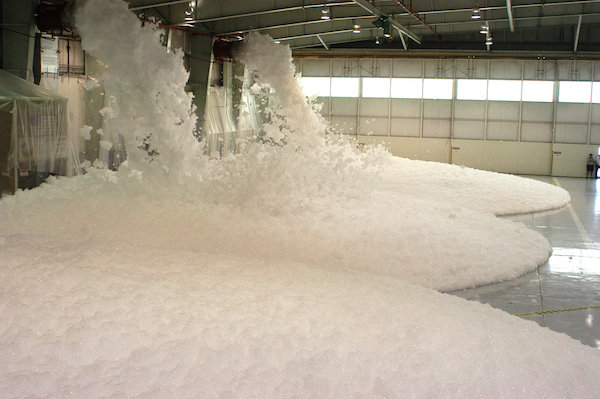We have seen firsthand how the insidious nature of PFAS pollution is creating major problems for residents and families in communities like Marinette and Peshtigo.
Folks like Ruth and John Kowalski, who live just a mile from a firefighting training facility in Marinette that has leached high levels of PFAS pollution into a creek behind their house, don’t bother turning on the tap. Instead, they rely on a weekly delivery of bottled water, and they don’t let their grandkids bathe at their house when they come to visit.
“We don’t know what the long-term effects on our health are. We don’t know what the long-term effects are for our economy,” said former Marinette Mayor Doug Oitzinger, a leader of the local group Save our Water working to find solutions to the PFAS pollution issue. “This is a problem that will be here for decades.”
PFAS, or per- and polyfluoroalkyl substances, is a group of persistent man-made chemicals (meaning they don’t easily break down in the environment and build up over time) found in common household products like dental floss and non-stick pans. These chemicals are also found in high concentrations in firefighting foams used at military bases and airports. When PFAS found in these foams get released into the environment, they can spell disaster for ground and surface water, like we have seen in Northeast Wisconsin.
While we know little about what harms PFAS exposure will do to public health in the long term, or even how widespread the contamination is, we do know this: it’s taking a toll on the residents of communities all around the state. People are tired of relying on bottled water. They’re frustrated that the health of their families could be in jeopardy. They want answers.
Recognizing the negative impacts and the need for a rapid, full response to the issue, a group of lawmakers introduced a bill that does not shy away from tackling this issue head on.
One of the most comprehensive bills in the nation on PFAS pollution, this bill, called the Chemical Level Enforcement and Remediation (CLEAR) Act, would address six different PFAS compounds that could contaminate drinking water, groundwater, surface water, air emissions, solid waste, and soils. It enables the Department of Natural Resources to more quickly establish enforceable health standards and to develop a long-term plan that simultaneously addresses PFAS pollution and protects public health.
While we know little about what harms PFAS exposure will do in the long term, we do know this: it’s taking a toll on the residents of communities all around the state.
How did this problem happen? In many ways, the PFAS pollution crisis is the perfect storm of limited scientific knowledge about the health impacts paired with widespread use and no enforcement mechanisms in place to limit contamination. Because of this, it is important that lawmakers do whatever is necessary to stem the growing tide of this emerging pollutant.
The CLEAR Act is a bold attempt to take a comprehensive approach to cleaning up PFAS pollution and prevent future pollution problems like the ones in Marinette. After hearing from local residents and community groups, lawmakers have listened and are aiming to fix this problem.
It’s time for lawmakers to support the CLEAR Act and be active players in working to tackle this problem in a major way. Lawmakers also need to make sure this bill gets the hearing we deserve. Every day without action only makes the problem more difficult to solve in the future.
If lawmakers are serious about protecting clean drinking water, they will sign on in support of the CLEAR Act and call for a hearing on this bill as soon as possible.


